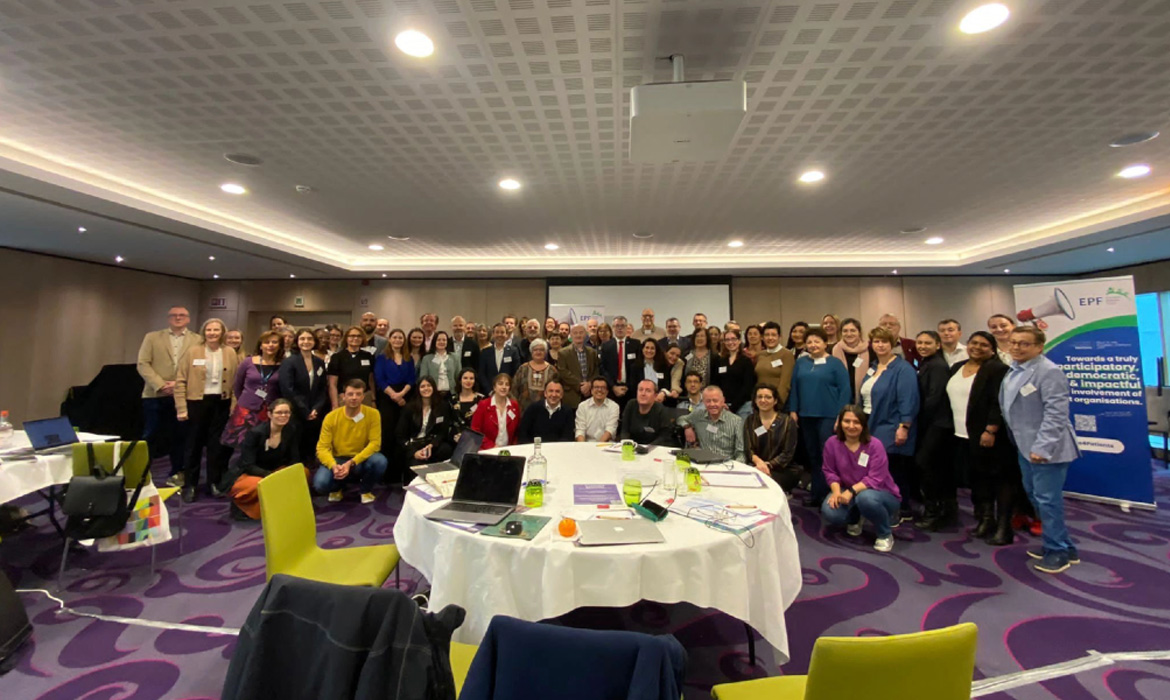Report from EPF’s AGM – Brussels 13th and 14 of April 2024

The European Patient Forum (EPF) recently convened its Annual General Meeting (AGM) in Brussels, inviting its full members to participate. The two-day event began with a focus on Artificial Intelligence (AI) on day one, followed by the official AGM proceedings on day two. Here’s a brief overview of the event:
Day 1 – AI:
The President of EPF, Marco Greco, welcomed attendees and provided a brief introduction to artificial intelligence (AI), highlighting both its benefits and potential risks.
The session continued with a presentation by Ildiko Vajda on the application of AI in healthcare, focusing on scientific research and the “Data Saves Lives – Toolkit” tool. Different types of AI were explored, including machine learning, computer vision, robotics, natural language processing, and speech recognition.
Antonio Andreu, Scientific Director of EATRIS, and Claudia Louati, EPF Head of Policy, discussed the various applications of AI, emphasizing its potential impact on personalized medicine and hospital administration. The importance of supervising AI and the EU regulatory framework in this regard was emphasized. It was predicted that in the next 3-5 years, there will be significant changes in the healthcare sector due to the use of AI, and that this technology can help address the future shortage of doctors and nurses in the EU.
During the conference, EPF’s advocacy efforts on AI in healthcare were presented, including its AI Capacity Building Program and the development of a position paper. The need to establish a social contract on data use was highlighted, and it was emphasized that AI should complement, not replace, traditional healthcare.
The policy panel discussed the rapid evolution of AI in the healthcare sector and the challenges in policymaking to keep pace with technological development. The importance of ensuring that AI development is based on European values, with an emphasis on data security, ethics, and human rights, was emphasized. The enormous potential of AI in healthcare was recognized, and it was urged to focus on who benefits from this technology, rather than on the technology itself.
In their closing remarks, Marco Greco and Elena Balestra emphasized the commitment of the patient community in the era of AI and the importance of their active participation in its development and application.
Day 2 – AGM:
The EPF President, Marco Greco, opened the meeting by addressing the challenges ahead, particularly the renewal of pharmaceutical legislation, which will have a significant impact for the next 20-25 years. He highlighted the fast-changing environment, including the rise of artificial intelligence (AI).
Key highlights from the annual report, presented by Flavia Topaz and Valentina Strammiello, included EPF’s 20th anniversary and the release of 8 position papers in 2023. The areas of work covered pharmaceutical legislation, medical devices, patient access to safe healthcare, antimicrobial resistance, and digital health. Projects that concluded in 2023 included EU Pearl, Eatris+, and Pariscope, while new projects launched in 2023 included EUCAPA, HEUEFS, and IDERHA. The theme of STYPA in 2023 was medical shortages.
EPF reported reaching a milestone of 10,000 LinkedIn followers, demonstrating a strong online presence and engagement within the community.
The financial report for 2023 showed an operating income of €2,380,722 and operating charges of €2,317,520, resulting in an operating result of €63,202 and a total result of €12,026. Major expenses included staff costs, subcontracting, and general costs. Sponsorship accounted for 63% of income, while EU projects contributed 32%.
Two new full member applications were received from the Sjögren association and an umbrella Slovenian association.
The work plan for 2024 focused on patient involvement, safety, equity, data and digital health, and community building through the Capacity Building Programme. The budget for 2024 was not approved during the meeting. An extraordinary general meeting will be held in a few weeks when the amount awarded by the EU is known. At that point, the budget will be presented and voted on.
Claudia Louati, EPF’s head of policy, discussed the upcoming EU elections and the need for advocacy efforts to ensure health remains a priority for policymakers, particularly in light of the anticipated shift towards right-wing ideologies.
Hall Skaara
Project Manager PHA Europe
Vienna, April 14th, 2024


